Topics
Category
Era
McCarthy, Eugene (1916–2005)
Senator Eugene McCarthy challenged President Lyndon Johnson for the 1968 Democratic nomination, mobilizing a youth crusade against U.S. intervention in Vietnam and changing the course of politics in Minnesota and the nation.
Eugene McCarthy was born in 1916 in the small central Minnesota community of Watkins. A scholarly boy and talented athlete, he attended nearby St. Johns University, embracing the Catholic social justice tradition he encountered there.
Returning from service as a code breaker for the Military Intelligence Division in 1946, McCarthy taught sociology and economics at St. Thomas University in St. Paul. He attracted a circle of young liberals and rose quickly in the Democratic Farmer Labor Party (DFL), winning election to Congress in 1948.
McCarthy distinguished himself in the House of Representatives. Nicknamed “the Needle” for his sharp wit, he was widely respected for his ability to articulate the heart of complex issues. By 1957, he helped organize a caucus of young liberals known as McCarthy’s Marauders. The organization and its set of legislative principles formed the basis of the influential Democratic Study Group.
In 1958, against the advice of many DFL Party insiders, McCarthy ran for the U.S. Senate, becoming the first Catholic ever elected to that position. Recognizing McCarthy’s legislative talents, the powerful Democratic majority leader, Lyndon Johnson, appointed him chair of the Special Committee on Unemployment Problems. The four-thousand-page report developed under McCarthy’s leadership became the blueprint for many of the domestic programs advocated by Presidents Kennedy and Johnson in the 1960s.
Elected to a second term in 1964, McCarthy joined the Senate’s Foreign Relations Committee. The war in Vietnam was continuing, with no end in sight. As the death toll mounted, he became increasingly critical of President Johnson’s continued escalation. When anti-war movement leaders sought a Democratic senator to do the unthinkable—challenge their party’s incumbent president— McCarthy was the only one willing to take up the call.
The first contest took place in the New Hampshire primary. Most experts expected President Johnson to defeat McCarthy in a landslide. Buoyed by an army of college-age volunteers, McCarthy received 42 percent of the vote. Convinced that he could not win re-election with a party divided by the war, Johnson shocked the nation when he announced that he would not run again.
McCarthy’s lonely challenge had sparked a movement—a “children’s crusade,” as the press referred to it. In his speeches, McCarthy mixed tough criticism of the administration’s war policies with poetry, philosophic musings, and sardonic wit. Some supporters looked for more passion and applause lines; others appreciated his unorthodox style as evidence of integrity.
With Johnson out of the race, two new candidates entered: Robert Kennedy, the heir to the legacy of his slain brother, John F. Kennedy, and Vice President Hubert Humphrey. With Humphrey refusing to break from the president’s war policies, Kennedy and McCarthy battled it out for leadership of the anti-war movement.
The decisive contest took place in California, where Kennedy’s passionate appeals to African American and working class voters proved decisive. His assassination, just minutes after his victory speech in a Los Angeles hotel, rocked the nation, splintered the anti-war movement, and made Humphrey’s nomination all but inevitable.
In late August, a badly fractured Democratic Party met in Chicago. The violent clashes between police and protestors in the street paralled the frustrations of delegates inside the convention. A movement that had begun with such hope just six months earlier in New Hampshire ended in defeat and disarray.
With Humphrey’s position on the war only slowly changing, McCarthy withheld his endorsement until the final days of the campaign. Humphrey narrowly lost to Richard Nixon.
The campaign of 1968 was a turning point for McCarthy. In opposing the president, McCarthy drew inspiration from Sir Thomas More, who chose principle over king and paid with his life. Emotionally exhausted, McCarthy withdrew for a time from politics, disappointing his followers by refusing to run for a third senate term in 1970.
He returned to writing, combining poetry with books on politics and public policy. Beginning in 1972, his maverick streak in full view, he ran a series of political campaigns, often as an independent or third party candidate. His wit and provocative intellect fully intact, he died of Parkinson’s disease in 2005.
Bibliography
Cline, Francis X. “Eugene McCarthy, Senate Dove who Jolted ’68 Race Dies at 89.” New York Times, December 11, 2005.
Dionne, E.J. “The Promise and Limits of Politics: What Gene McCarthy Taught Us.” Commonweal 134, no. 4 (November 9, 2007): 12.
Eisele, Albert. Almost to the Presidency: A Biography of Two American Politicians. Blue Earth, MN: Piper Press. 1972.
McCarthy Center for Public Policy, St. Johns University. Who is Eugene J. McCarthy?
http://www.csbsju.edu/mccarthy-center/about-the-center/who-is-eugene-j-mccarthy
Stuhler, Barbara. Ten Men of Minnesota and American Foreign Policy, 1898–1968. St.Paul: Minnesota Historical Society Press, 1973.
Related Resources
Primary
C-SPAN. Eugene J. McCarthy.
http://www.c-span.org/person/?eugenemccarthy
“Eugene McCarthy Centennial Celebration.” YouTube video, 1:37:46. Posted by “McCarthy Center,” April 20, 2016.
https://www.youtube.com/watch?v=anfdHQL-7Jo
“Eugene McCarthy on Doing the Right Thing 1967.” YouTube video, 1:01. Posted by “historycomestolife,” March 20, 2011.
https://www.youtube.com/watch?v=8H7a0JTpDdA
Hazard, Michael. I’m Sorry I Was Right: Eugene McCarthy. VHS. St. Paul: St. Paul Center for International Education, 2001.
McCarthy, Abigail. Private Faces/Public Places. Garden City, NY: Doubleday, 1972.
McCarthy, Eugene. A Colony of the World: the United States Today; America’s Senior Statesman Warns His Countrymen. New York: Hippocrene Books, 1992.
——— . Frontiers of American Democracy. Cleveland: World Publishing, 1960.
——— . Gene McCarthy’s Minnesota: Memories of a Native Son. Minneapolis: Winston Press, 1982.
——— . The Hard Years: A Look at Contemporary America and American Institutions. New York: Viking Press, 1975.
——— . The Limits of Power: America’s Role in the World. New York: Holt, Rinehart and Winston, 1967.
——— . No-Fault Politics: Modern Presidents, the Press and Reformers. New York: Times Books, 1998.
——— . Parting Shots From My Brittle Bow: Reflections on American Politics and Life. Golden, CO: Fulcrum Press, 2004.
——— . A Political Bestiary. New York: McGraw Hill, 1978.
——— . Required Reading: A Decade of Political Wit & Wisdom. San Diego: Harcourt Brace Jovanovich, 1988.
——— . The Ultimate Tyranny: The Majority Over the Minority. New York: Harcourt Brace Jovanovich, 1980.
——— . The Year of the People. Garden City, NY: Doubleday, 1969.
Executive files, Eugene J. McCarthy papers, 1959–1976
Manuscript Collection, Minnesota Historical Society, St. Paul
Description: Correspondence between citizens and McCarthy and departments of the federal government. They are filed chronologically and then alphabetically by name of the cabinet agency and then alphabetically by the various sub-agencies under each cabinet department.
http://www2.mnhs.org/library/findaids/00916.xml
Legislative files, Eugene J. McCarthy papers, 1948–1972
Manuscript Collection, Minnesota Historical Society, St. Paul
Description: The legislative files include bill files, bills introduced by McCarthy, congressional activity files, remarks, correspondence, independent agency files, miscellaneous files, Senate Committee files, Senate Foreign Relations Committee files, testimony by McCarthy made before committees, and voting records.
http://www2.mnhs.org/library/findaids/00918.xml
Personal files, Eugene J. McCarthy papers, 1950–2000.
Manuscript Collection, Minnesota Historical Society, St. Paul
Description: Personal papers focus on McCarthy's writing. Account statements and order books, certificates and awards, membership files, schedule and trip files, daily reminders, and appointments are also available.
http://www2.mnhs.org/library/findaids/00919.xml
“Peter, Paul and Mary – Eugene McCarthy for President (If You Love Your Country).” YouTube video, 3:09. Posted by “Vietnam War Song Project,” April 26, 2013.
https://www.youtube.com/watch?v=TgKI-hytNMs
Speech files, Eugene J. McCarthy papers, 1959–1989
Manuscript Collection, Minnesota Historical Society, St. Paul
Description: Consists of general and senate speeches, including speech drafts and notes, interviews, and panels.
http://www2.mnhs.org/library/findaids/00923.xml
Sound and visual materials, Eugene J. McCarthy papers, 1948–1969
Manuscript Collection, Minnesota Historical Society, St. Paul
Description: Photographs (family, publicity, campaign-related, and miscellaneous), negatives, sound reel tapes, sound cassettes, and film reels of campaign spots, speeches, and debates. Also includes film and sound tapes of appearances by Eugene McCarthy on national and local television and radio. Sound and visual materials are arranged by type.
http://www2.mnhs.org/library/findaids/00922.xml
Secondary
“1968 Democratic Convention.” YouTube video, 50:32. Posted by “mitch19872,” June 29, 2012.
https://www.youtube.com/watch?v=1Iye1NQy1NY
“Eugene McCarthy film - Hi Gene! Meet the Real Senator McCarthy.” YouTube video, 29:39. Posted by “Robbob Radio,” March 28, 2016.
https://www.youtube.com/watch?v=4sg0GgmIlaw
Hoeh, David. 1968, New Hampshire: I Hear America Singing. Rochester, MN: Lone Oak Press, 1994.
Lebedoff, David. Ward Number Six. New York: Scribner, 1972.
Mailer, Norman. Miami and the Siege of Chicago: An Informal History of the Republican and Democratic Conventions of 1968. New York: New York Review of Books Classics, 2008.
Rising, George. Clean for Gene: Eugene McCarthy’s 1968 Presidential Campaign. Westport, CT: Praeger, 1997.
Sandbrook, Dominic. Eugene McCarthy: the Rise and Fall of Postwar American Liberalism. New York: Alfred A. Knopf, 2004.
Witcover, Julius. The Year the Dream Died: Revisiting 1968 in America. New York: Grand Central Publishing, 1997.
Related Images
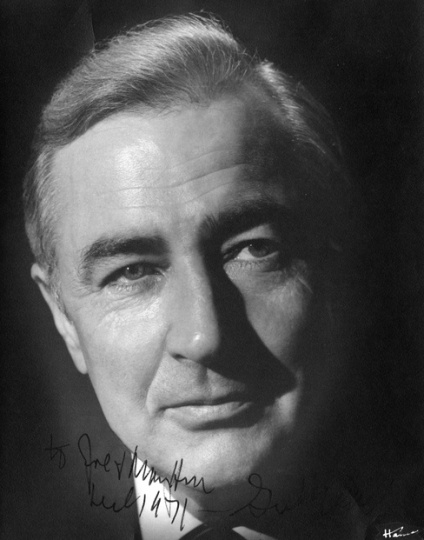
Eugene McCarthy
Holding Location
Articles
More Information
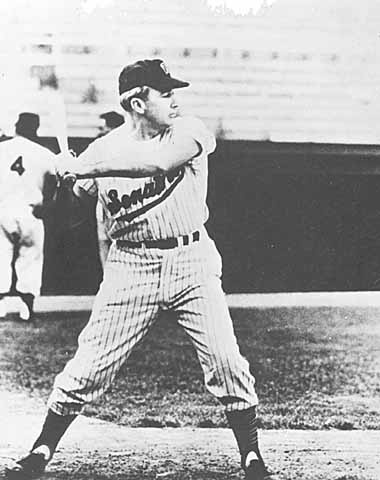
Eugene McCarthy in a Washington Senators baseball uniform
Holding Location
Articles
More Information
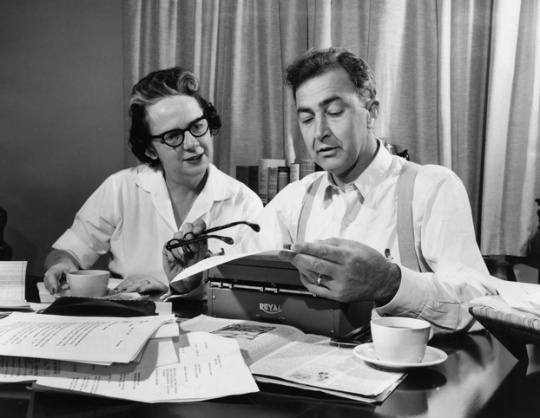
Eugene and Abigail McCarthy
Holding Location
Articles
More Information
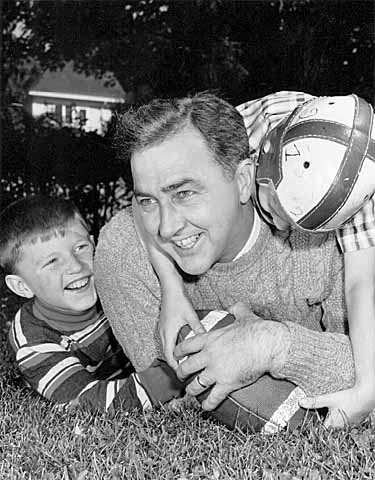
Eugene McCarthy with son Michael and unknown boy
Holding Location
Articles
More Information
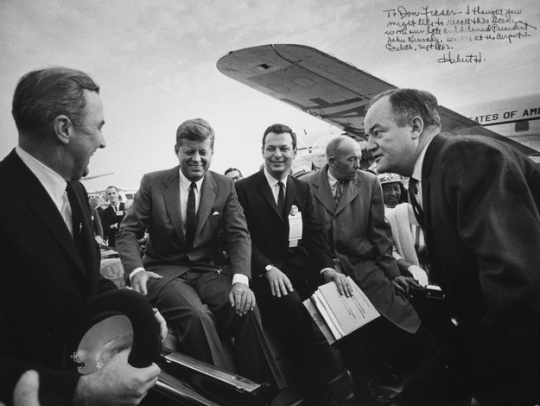
President John F. Kennedy, Eugene McCarthy, Donald Fraser, Karl Rolvaag, and Hubert H. Humphrey
Holding Location
More Information
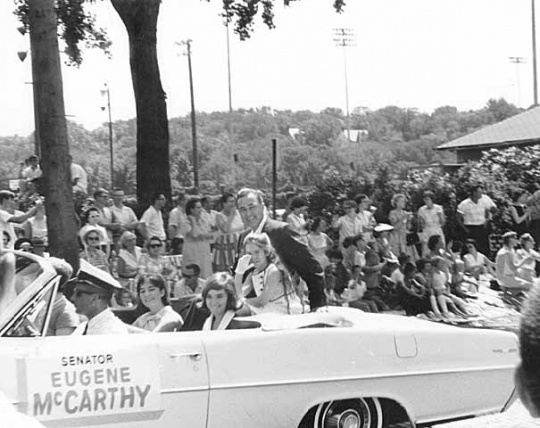
Eugene McCarthy in a parade, with his daughters
Holding Location
Articles
More Information
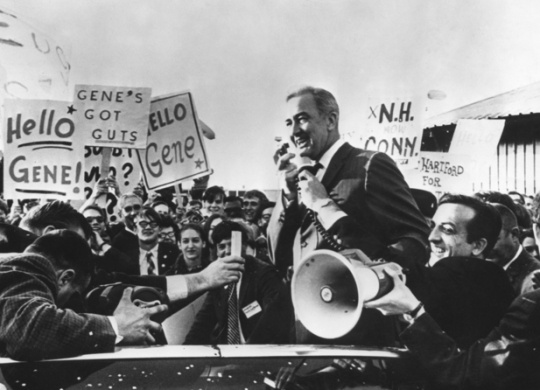
Eugene McCarthy during presidential primary campaign
Holding Location
Articles
More Information
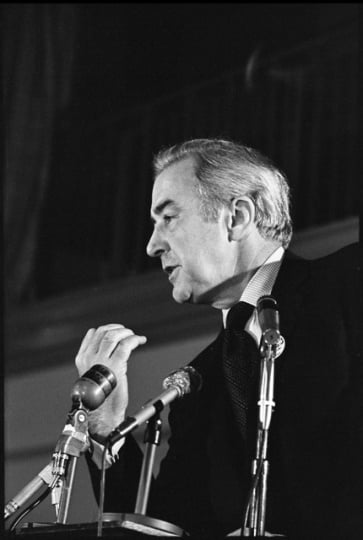
Senator Eugene McCarthy speaking at St. John's University
Holding Location
Articles
More Information
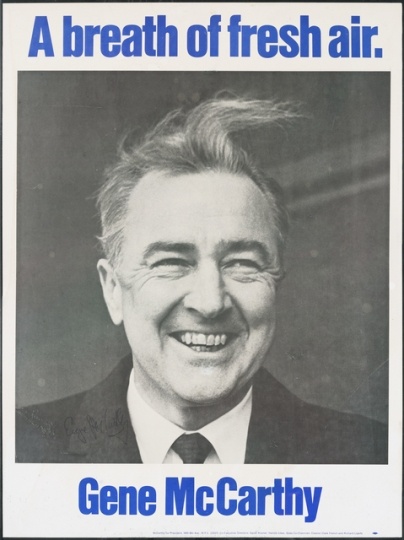
"A Breath of Fresh Air. Gene McCarthy" poster
"A Breath of Fresh Air. Gene McCarthy" poster, 1968.
Holding Location
Articles
More Information
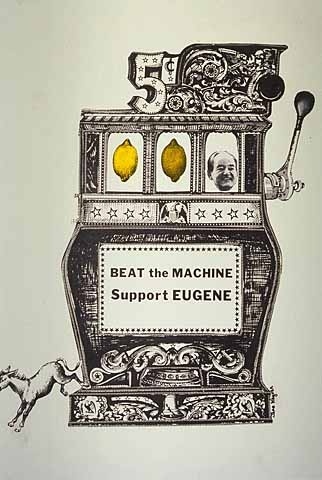
"Beat the Machine - Support Eugene" poster
"Beat the Machine - Support Eugene" poster, 1968.
Holding Location
Articles
More Information
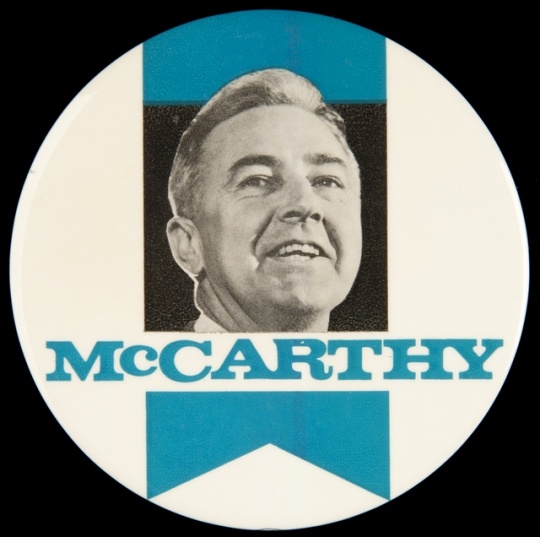
Eugene McCarthy campaign button
All rights reserved
Holding Location
Articles
More Information
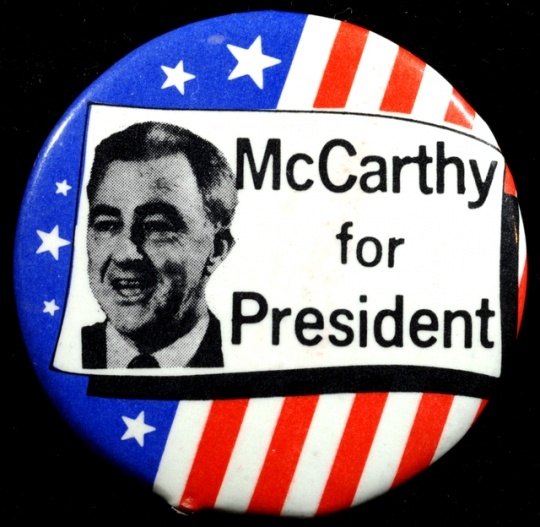
"McCarthy for President" button
"McCarthy for President" button, 1968.
All rights reserved
Holding Location
More Information
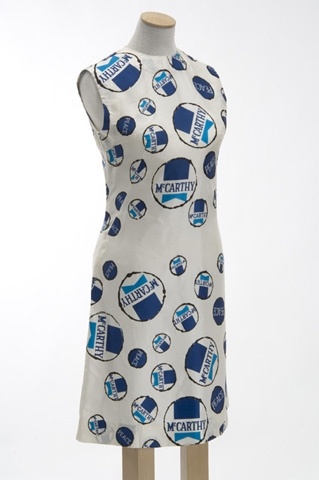
McCarthy campaign peace dress
All rights reserved
Holding Location
Articles
More Information
Related Articles
Turning Point
On November 30, 1967, McCarthy announces his decision to oppose President Lyndon Johnson for the Democratic presidential nomination. His subsequent campaign mobilizes a nation-wide anti-war movement that leads to the president’s withdrawal and a national debate on the Vietnam War.
Chronology
1916
1932
1935
1945
1946
1948
c.1950
1958
Winter 1968
Spring–Summer 1968
August 1968
November 5, 1968
1969
2005
2006
Bibliography
Cline, Francis X. “Eugene McCarthy, Senate Dove who Jolted ’68 Race Dies at 89.” New York Times, December 11, 2005.
Dionne, E.J. “The Promise and Limits of Politics: What Gene McCarthy Taught Us.” Commonweal 134, no. 4 (November 9, 2007): 12.
Eisele, Albert. Almost to the Presidency: A Biography of Two American Politicians. Blue Earth, MN: Piper Press. 1972.
McCarthy Center for Public Policy, St. Johns University. Who is Eugene J. McCarthy?
http://www.csbsju.edu/mccarthy-center/about-the-center/who-is-eugene-j-mccarthy
Stuhler, Barbara. Ten Men of Minnesota and American Foreign Policy, 1898–1968. St.Paul: Minnesota Historical Society Press, 1973.
Related Resources
Primary
C-SPAN. Eugene J. McCarthy.
http://www.c-span.org/person/?eugenemccarthy
“Eugene McCarthy Centennial Celebration.” YouTube video, 1:37:46. Posted by “McCarthy Center,” April 20, 2016.
https://www.youtube.com/watch?v=anfdHQL-7Jo
“Eugene McCarthy on Doing the Right Thing 1967.” YouTube video, 1:01. Posted by “historycomestolife,” March 20, 2011.
https://www.youtube.com/watch?v=8H7a0JTpDdA
Hazard, Michael. I’m Sorry I Was Right: Eugene McCarthy. VHS. St. Paul: St. Paul Center for International Education, 2001.
McCarthy, Abigail. Private Faces/Public Places. Garden City, NY: Doubleday, 1972.
McCarthy, Eugene. A Colony of the World: the United States Today; America’s Senior Statesman Warns His Countrymen. New York: Hippocrene Books, 1992.
——— . Frontiers of American Democracy. Cleveland: World Publishing, 1960.
——— . Gene McCarthy’s Minnesota: Memories of a Native Son. Minneapolis: Winston Press, 1982.
——— . The Hard Years: A Look at Contemporary America and American Institutions. New York: Viking Press, 1975.
——— . The Limits of Power: America’s Role in the World. New York: Holt, Rinehart and Winston, 1967.
——— . No-Fault Politics: Modern Presidents, the Press and Reformers. New York: Times Books, 1998.
——— . Parting Shots From My Brittle Bow: Reflections on American Politics and Life. Golden, CO: Fulcrum Press, 2004.
——— . A Political Bestiary. New York: McGraw Hill, 1978.
——— . Required Reading: A Decade of Political Wit & Wisdom. San Diego: Harcourt Brace Jovanovich, 1988.
——— . The Ultimate Tyranny: The Majority Over the Minority. New York: Harcourt Brace Jovanovich, 1980.
——— . The Year of the People. Garden City, NY: Doubleday, 1969.
Executive files, Eugene J. McCarthy papers, 1959–1976
Manuscript Collection, Minnesota Historical Society, St. Paul
Description: Correspondence between citizens and McCarthy and departments of the federal government. They are filed chronologically and then alphabetically by name of the cabinet agency and then alphabetically by the various sub-agencies under each cabinet department.
http://www2.mnhs.org/library/findaids/00916.xml
Legislative files, Eugene J. McCarthy papers, 1948–1972
Manuscript Collection, Minnesota Historical Society, St. Paul
Description: The legislative files include bill files, bills introduced by McCarthy, congressional activity files, remarks, correspondence, independent agency files, miscellaneous files, Senate Committee files, Senate Foreign Relations Committee files, testimony by McCarthy made before committees, and voting records.
http://www2.mnhs.org/library/findaids/00918.xml
Personal files, Eugene J. McCarthy papers, 1950–2000.
Manuscript Collection, Minnesota Historical Society, St. Paul
Description: Personal papers focus on McCarthy's writing. Account statements and order books, certificates and awards, membership files, schedule and trip files, daily reminders, and appointments are also available.
http://www2.mnhs.org/library/findaids/00919.xml
“Peter, Paul and Mary – Eugene McCarthy for President (If You Love Your Country).” YouTube video, 3:09. Posted by “Vietnam War Song Project,” April 26, 2013.
https://www.youtube.com/watch?v=TgKI-hytNMs
Speech files, Eugene J. McCarthy papers, 1959–1989
Manuscript Collection, Minnesota Historical Society, St. Paul
Description: Consists of general and senate speeches, including speech drafts and notes, interviews, and panels.
http://www2.mnhs.org/library/findaids/00923.xml
Sound and visual materials, Eugene J. McCarthy papers, 1948–1969
Manuscript Collection, Minnesota Historical Society, St. Paul
Description: Photographs (family, publicity, campaign-related, and miscellaneous), negatives, sound reel tapes, sound cassettes, and film reels of campaign spots, speeches, and debates. Also includes film and sound tapes of appearances by Eugene McCarthy on national and local television and radio. Sound and visual materials are arranged by type.
http://www2.mnhs.org/library/findaids/00922.xml
Secondary
“1968 Democratic Convention.” YouTube video, 50:32. Posted by “mitch19872,” June 29, 2012.
https://www.youtube.com/watch?v=1Iye1NQy1NY
“Eugene McCarthy film - Hi Gene! Meet the Real Senator McCarthy.” YouTube video, 29:39. Posted by “Robbob Radio,” March 28, 2016.
https://www.youtube.com/watch?v=4sg0GgmIlaw
Hoeh, David. 1968, New Hampshire: I Hear America Singing. Rochester, MN: Lone Oak Press, 1994.
Lebedoff, David. Ward Number Six. New York: Scribner, 1972.
Mailer, Norman. Miami and the Siege of Chicago: An Informal History of the Republican and Democratic Conventions of 1968. New York: New York Review of Books Classics, 2008.
Rising, George. Clean for Gene: Eugene McCarthy’s 1968 Presidential Campaign. Westport, CT: Praeger, 1997.
Sandbrook, Dominic. Eugene McCarthy: the Rise and Fall of Postwar American Liberalism. New York: Alfred A. Knopf, 2004.
Witcover, Julius. The Year the Dream Died: Revisiting 1968 in America. New York: Grand Central Publishing, 1997.














